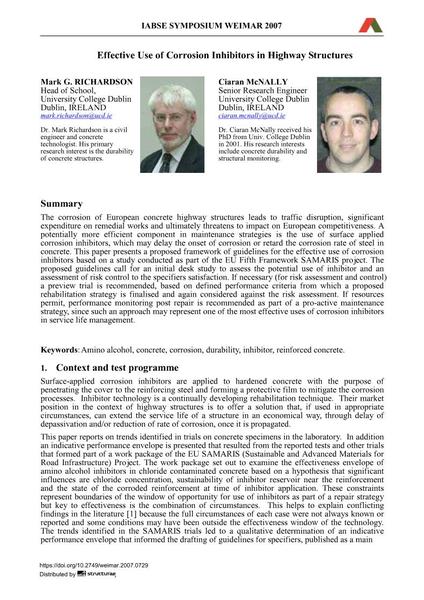Effective Use of Corrosion Inhibitors in Highway Structures

|
|
|||||||||||
Bibliographic Details
| Author(s): |
Mark G. Richardson
Ciaran McNally |
||||
|---|---|---|---|---|---|
| Medium: | conference paper | ||||
| Language(s): | English | ||||
| Conference: | IABSE Symposium: Improving Infrastructure Worldwide, Weimar, Germany, 19-21 September 2007 | ||||
| Published in: | IABSE Symposium Weimar 2007 | ||||
|
|||||
| Page(s): | 516-517 | ||||
| Total no. of pages: | 7 | ||||
| Year: | 2007 | ||||
| DOI: | 10.2749/weimar.2007.0729 | ||||
| Abstract: |
The corrosion of European concrete highway structures leads to traffic disruption, significant expenditure on remedial works and ultimately threatens to impact on European competitiveness. A potentially more efficient component in maintenance strategies is the use of surface applied corrosion inhibitors, which may delay the onset of corrosion or retard the corrosion rate of steel in concrete. This paper presents a proposed framework of guidelines for the effective use of corrosion inhibitors based on a study conducted as part of the EU Fifth Framework SAMARIS project. The proposed guidelines call for an initial desk study to assess the potential use of inhibitor and an assessment of risk control to the specifiers satisfaction. If necessary (for risk assessment and control) a preview trial is recommended, based on defined performance criteria from which a proposed rehabilitation strategy is finalised and again considered against the risk assessment. If resources permit, performance monitoring post repair is recommended as part of a pro-active maintenance strategy, since such an approach may represent one of the most effective uses of corrosion inhibitors in service life management. |
||||
| Keywords: |
concrete durability corrosion reinforced concrete amino alcohol inhibitor
|
||||
